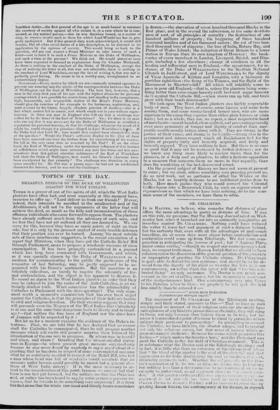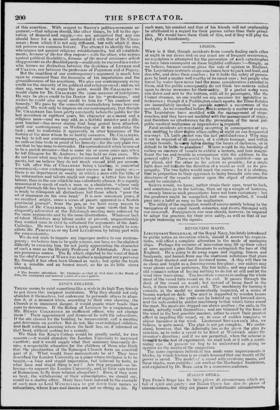DR. CHALMERS.
Jr is RACINE, we believe, who remarks that distance of place offers the same advantage to poetry as distance of time. It was on this rule, we presume, that the Morning- Journal acted on Wed- nesday last, when it launched out into so eminently imaginative an invective against Dr. CHALMERS. Nothing could have induced the writer to leave fact and argument at. such a distance behind, but the certainty that, even with all the advantages of mail-coach travelling, six or seven days must elapse before contradiction and confutation could come up from Edinburgh. We feel some com- punction in anticipating the :course of post ; but " Amiens Plato,• major arnica veritas,"—though we respect our contempormy's feel- ings, we respect truth more. Heaven forbid that we sloemld iii these columns renew the discussion of the general question of time propriety or impropriety of granting the Catholic chums. Dr. CHALmans is quite able to defend his own opinions and should he so far de- scend front the dignity of his chair as to enter the lists v him our contemporary, we rather think the latter will find " the !Me cAe- hrated divine" an ugly customer. The Doctor is not rettell con- versant in the art of calling names, but his reasoning is somewhat of the slede-hannuer kind. Our contemporary niav plav Dares to his Entellus when he likes: we prophesy he wi:1 cia;t the field less nimbly than he entered it :— " genua oegra traitentem Jactantemque utroque caput."
The argument of Dr. CHALMERS at the Edinburgh meeting, simply and fairly stated, amounts to this—" That so long as men
are exposed on account. of their religious opinions (he m;ght have said opinions of any kind) to persecution or disability, 11 ;ay will cling to them, not only because they believe them to he fra, hot be- cause it is considered apoint of honour to stand by prnici;la: which subject their professor to persecution :" In attempting to ccalvert the Catholic, we have hitherto, the Doctor alleges, had to combat not only his religious errors, but that sense of lamoor which at- guinents cannot. eradicate : Remove the cause whieli generates this feeling—" which makes the heretic a hero," and the Protestant can meet the Catholic in the fair field of Christian argument. This is in substance what the Doctor said at the Edinimigh meeting : and in fact, it is little else than an extension of the old-rec:iv;q1 that " the blood of the maxtyr is the seed of the churell," and I f oppression so far from diminishing the zeal or numbeni of invariably augments both. Whether the old prmerh, or tor's application of it, be true or false, We do no; stot to i:11. re ; but nothing less than a (lei:T(111SM hots to lir :to in- acity to understand, cuold represent either as ' a suifrie I.:tra- ct:ix: A still greater confusion foil. Vs : our sav.; he argument is not new—it has been used by every inildoi from DAy to Hums to Josk; 11 umE ; aud lie !,rues on to prove ihisby quoting ADAM SMITH, the contemporary 01 the former, in support of this assertion. With respect to SMITH'S politico-economic ar- gument,—that religion should, like other things, be left to the ope- ration of demand and supply,—we are astonished that any one should have for a moment oonfounded it with that of Dr. CHAL- MERS; from which it is not only different, but with which it does not possess one common feature. The attempt to identify the one, who argues not against religious establishments, but all establish- ments, because of the tar they impose—with the other, who argues against political disabilitias, because of the moral resistance which they generate in the disabled party—could only be excused in a writer who knows no distinction between the doctrines of LUTHER and of CALVIN, nor between the profession of Paganism and of Popery. But the rambling of our contemporary's argument is much less open to comment than the looseness of his imputations and the groundlessness of his assertions. We give our contemporary every credit for the sincerity of his political and religious creed ; and so, we dare say, were he to argue the point, would Dr. CHALMERS: we • would claim for Dr. CHALMERS the same measure of indulgence. He says he gives credit to the Doctor for his "professions," and wishes he could give equal credit to him for "his candour and honesty." We pass by the somewhat contradictory terms here em- ployed. We wish only to impress on our contemporary, that though Dr. CHALMERS has been pretty constantly before the public for the last seventeen or eighteen years, his character as a moral and .a religious man—and we may add, as a faithful minister and a dili- gent teacher—has never during that long period been attacked, until our contemporary on Wednesday saw fit to undertake the task ; and to undertake it apparently in utter ignorance of the history of the man whom he so hastily censures. Dr. CHALMERS, we beg to tell our contemporary, cannot surrender his stipend, as he calls on him to do in proof of his honesty—for the very plain rea- son that he has none to surrender. He surrendered it when lie ceased to be a parish minister—that is some six or seven years ago, when he left Glasgow for St. Andrews : he has held no cure since. We - do not know what may be the precise amount of his present emolu- ments, but we believe they do not much exceed 2001. per annum. To talk after this of CHALMERS being a hireling, is somewhat nonsensical,—our contemporary must excuse us for saying .so ;— there is no department in society in which a man with the tithe of his information and talents might not reeeive a better hire for his labour, than in the one which he has voluntarily chosen. It is equally nonsensical to speak of such a man as a charlatan, "whose only object through life has been to advance his own interests," and who is ready to relinquish all distinctions but those which "pour the oil of mammon on his own head." It is now seventeen years, if we recollect aright, since a series of papers appeared in a Scotch provincial journal*, from the .pen, as we have every reason to beheve, of Dr. CHALMERS, in which the same views that he so eloquently advocated at the Edinburgh meeting were enforced by the same arguments and by the same illustrations. Whatever lack of talent Ministers may labour under at present, unquestionably they wanted none in 1812 to withstand the arguments of the Anti- Catholics. He must have been a sorry quack who sought to con- ciliate Mr. PERCEVAL or my Lord LIVERPOOL by taking part with the concessionists.
We do not wish to impute any improper motive to our contem- porary; we believe him to be quite sincere, nor have we the slightest difficulty in excusing him for not justly appreciating the character of such a man as the Divinity Professor of Edinburgh. .Non om- nia possum us wines. The fly which objected to the want of finish in the chef d' mime of WREN was neither a malignant nor a perverse fly, though it has often been blamed as such ; but spoke the truth like a sensible and an honest insect, as far as its little views extended.
* The Dundee Advertiser. Dr. Chalmers resided at that time in the North of Fife, the exemplary and beloved pastor of a rural parish.



















 Previous page
Previous page